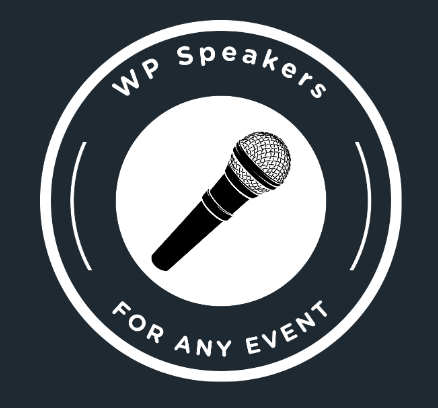Being A Non-Native English Speaker in Tech
Episode 5: What is it like being a non-native English speaker in tech?
So much of the tech space tends to lean toward Western communities and the English language. In this episode Michelle Frechette talks to Romine Rocha Gois Cavalcante, Milan Ivanovic, and Shusei Toda about helpful translation technology, swapping from one language to another, how to incorporate more languages at events, and more.
Our Panelists
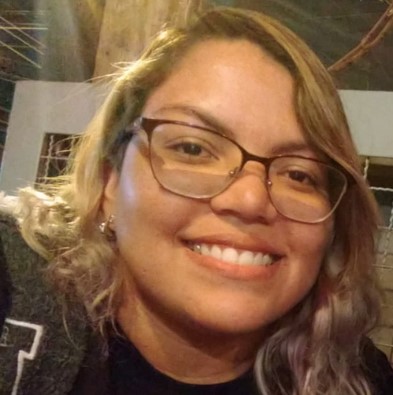
Romine Rocha Gois Cavalcante
An enthusiast about QA that lives between many pets on a Farm.

Milan Ivanovic
Father / Developer / Amateur Photographer – based in Belgrade, Serbia. In love with Open Source.

Shusei Toda
Shusei is a creative director / business strategist based in Tokyo, Japan. Having the background of being a web-designer and engineer, currently focuses on creating brand/corporate/visual contents for clients such as: photos, videos and creative strategy. Had been involved with the WordPress community since 2018 and had been organizing several WordCamps and Meetups in Japan. Currently working at Kinsta as Business Development Specialist for Japanese market.
Episode Transcript
What is it like being a non-native English speaker in tech?
Michelle Frechette:
Hello. Here I am back again with a wonderful group of people for our Underrepresented in Tech webinar series. It’s just such an honor to have the three of you today. I’m here today with Milan Ivanovic, Shusei Toda, and Romine Cavalcante. Thank you so much for being here today. I want to have you introduce yourself so people know who we’re talking to. Our group today, our focus is on people for whom English is not their primary language. I think it’s wonderful. I am learning Spanish. I’m also almost up to a thousand days on Duolingo learning Spanish, but I cannot speak Spanish as clearly as… I want to say easily. Although I don’t know how a language acquisition was for you, but you all are at least bilingual, if not more than that, which you possibly could be. But thank you for being able to communicate with me in my language today and to be able to tell everybody else what that feels like in the tech community. So Milan, I am going to start with you. Go ahead and introduce yourself for us.
Milan Ivanovic:
Oh, thank you. Thanks, Michelle, for the intro and thanks for the invite. Pleasure to be here. Milan, I’m based in Belgrade, Serbia. Father of one boy, and we recently, just like two days ago, we found out that my wife is carrying another boy. We were actually hoping for a baby girl. But we’ll see. We want one of each. But my primary language is Serbian. As a kid, I learned a little bit of German because all my relatives on my mother’s side, they lived in Austria, so I was just visiting my grandparents a lot. But soon I realized that life is too short to learn German. That’s why I switched to English because of all the movies and the music.
Michelle Frechette:
Well thanks for being here today. Shusei, over to you.
Shusei Toda:
Thank you. Thank you, Michelle. I’m happy to be here again too. My name is Shusei, and I am based in Tokyo, Japan. And yes, I am in Japan and my native language is Japanese and I speak a little bit of Spanish also, and my secondary language will be English, as of topic of today. I grew up in the United States when I was little, so that’s when I learned English. And funny story is I had several years that I had forgotten my native language and now that I’m based in Tokyo again, I use Japanese mostly every day and English sometimes, but my work is in English. So that’s me. Thank you. Happy to be here.
Michelle Frechette:
Thanks. Thanks for being here. Romine, over to you.
Romine Cavalcante:
Thank you for the invite. I’m based in Brazil on the Sao Paulo state. As you know, my primary language is Portuguese, not the core as Portugal, it’s different than the Brazilian, Portuguese. About English, here in Brazil it is a bit common to children to learn it early because we use it a lot on the exams to college. So you need to choose between, at least when I started doing, it’s different now, but some years ago you needed to choose between English and Spanish. So a lot of people started learning really early. It was a bit difficult here the Brazil because we don’t have anybody to exercise your English. So it’s really different if somebody starts…
When I started learning, I think I did nine years of course of English, and yet when I started my first job in a global company, it was like I was talking to aliens because I didn’t know how to speak well or even the accent. So it’s really different to really learn from somebody that you can talk with. Then doing a course in a country that nobody really speaks it, it just like an exercise, let’s say. And I live in a small farm with a lot of pets, really a lot of pets. I think dogs, cats, to birds, a lot of chickens like that.
Michelle Frechette:
That’s one of the first things we learn when we learn a second language is the names of animals. I don’t know why, but that’s one of the first things that they teach you, right?
Romine Cavalcante:
Yeah, exactly.
Michelle Frechette:
One of my favorite things, I studied, well I took French classes in high school and the favorite thing was to learn what does it sound like when somebody in another language says what their animal says? So we would say in English woof, but in French it’s waaf waaf. So it’s always different and I always get a kick out of that, but that’s not what we’re here to talk about. So let me get into our first question which is, what do you wish people knew or understood about what it’s like to be a non-native English speaker in tech?
Shusei Toda:
Well, as we all can imagine, every single elements or the words are different than each language. So if you say computer, maybe that’s popular around the world, but if you get deeper into tech, some of the words are different in other languages and it’s easy for non-English speakers to understanding in their native language. But if it’s spoken in English, the words come out of English, sometimes people get confused. So that’s like, I wish people knew more… A lot of people knows about this, but more people… It should be broadly known that each… How we call elements in other language is different around the world.
And as English is the most used language around the world, people speak in different speeds. So the faster you speak, it is harder to understand, but the slower you speak, it might be easy for others to understand. So I think a lot of people know about this, but I wish this could be more known broadly so that we all could be, let’s say, nice to each other maybe. Like four of us here, we all speak English and we speak in this little normal speed, but some people are fast and sometimes that could get tricky, I would say.
Michelle Frechette:
I have been accused of speaking fast my whole life, so I will try to be cognizant of that going forward.
Shusei Toda:
You’re fine.
Michelle Frechette:
But I still appreciate that because sometimes I’m on a stage giving a talk where everybody in the audience is not following English as quickly as others might be able to. And so that’s such a good tip, not just one-on-one, but when you’re talking to an audience to remember that no matter how nervous you are, you should slow down your talk a little bit.
Romine Cavalcante:
I agree with what you saying. I think another tip that I can give is two people non-native because for example in Brazil people ask too much from them, to be able to talk perfectly in English. And after I started working in a global company, I noticed that we don’t need to be the perfect [inaudible 00:08:00] English speaker. We just need to be able to understand each other. And I think we need to be more kind to ourselves. A lot of people sometimes ask too much of others, you need to be perfect, you need to speak really, really well. But it’s not really like that.
Even when I went to USA, as I said to you, I didn’t speak that much and learning how to, but I didn’t know how to speak [inaudible 00:08:28] because different, because of the accent and the way to talk and everybody was kind to me, everybody was understandable. And even a different country if I didn’t know how to even count coins, everybody was really kind to me to explain. While people in Brazil need to know this kind of stuff, but no, you don’t need to know this kind of stuff. You can be kind to yourself, you were able to not know something or to ask to repeat something because you didn’t understand the words to explain in another way because you didn’t understand it. So you don’t need to ask that much for you. You can be kind to yourself.
Michelle Frechette:
I think that’s really good advice. Absolutely. It’s absolutely to make sure that you are comfortable with yourself and that you give yourself some grace and some room to, because you’re learning, we’re always all learning all the time, and especially when you are in that more acquisition state of learning another language to be kind and gentle to yourself. I think that’s really good advice. Milan?
Milan Ivanovic:
Yeah, so we studied British English. We started in fifth grade when I was going to the elementary school. Now it’s from the first grade. Even my kids now in the kindergarten, they will start with English, even the age three I think, or four. They are already starting. But with all the YouTube and all the videos, my kid is already doing yellow. Like no, žuta. In Serbian, it’s žuta. No yellow. And when he falls he’s like, oh no, like in English. Well on Shusei, just to add on speeds, I have personally, I have troubles understanding the Aussie English from Australia when they talk now, no, I just can’t do it.
Because of all the movies and Hollywood and Disney, the closest English to me is the US English. For British English, even though we grew up with BBC shows in Serbia. But sometimes it’s harder for me just to… It’s not pavement, it’s always going to be sidewalk. It’s never going to be… Those kinds of things. It’s never going to be… It’s trash, it’s not like the bin. So just those things. Yeah, I wish when conversations actually happen that… If you have at least someone who’s not native, don’t use slang and that much and just pace yourself. Even though when we talk about some subjects, the speed of how fast we are actually talking really depends on how passionate are we on the subject. So if you see someone that is really passionate to try to explain something about, let’s say about WordPress or whichever, the things that happened on holidays, they just speed up with a passion. If you see someone who’s non-native, just like… Yeah, be understanding and just pace yourself.
Michelle Frechette:
It’s funny that you bring up trash versus bin. The first time I ever logged into a website that had been built, a WordPress website that had been built in the UK, I was looking for trash to delete something and then I realized it didn’t say trash, it said bin, right in the website itself. And I was like, never occurred to me that that would be the case because it’s still English. But yes, it’s a different part of it, a different style of English if you will. Yeah, for sure. What is the biggest challenge that’s facing you and others like you as non-native English speakers in technology right now? What would you say is something that’s… I don’t want to say a struggle necessarily, but a challenge for you?
Milan Ivanovic:
I can take on that. The biggest challenge is for me to actually talk about some tech stuff in Serbian because when I learned all the things, when I read all the books, all the tutorials, they were in English. So when I do a talk, my slides need to be in English for me to understand it, for me to know, even though the talk is in Serbian, the slides need to be in English because if I see other than plugins, it’s going to be like they’re Serbian translation for that. Even though I was the one who did the actual translation in Serbian, I’d be like, what was the thing that I wanted to talk about here? Oh, it’s plugins. Then I switch back to English and then I do… So yeah, that’s the biggest challenge that I’m facing.
Just like now speaking my own language, the things that I learned, I would never say knees, it’s always going to be [inaudible 00:13:33] for me. And when I see knees or in some Serbian translation of stuff, I’m like, I can’t do it. I was about to fix my mother’s phone and it’s in Serbian, I’ll be like, you know what? I need to switch to English in order for me to set the ringtone and then I’m going to put it back in Serbian. So that’s the biggest challenge to understand things like that now in my own language.
Michelle Frechette:
What a strange thing to have to do in your own head. And I imagine it almost feels like betraying your own language in some respects.
Shusei Toda:
Funny thing, I have the same thing as Milan. I have everything set up in English since English was the language I grew up in. So when I had to set up my father and mother’s iPad, I set it up in English, I pass it on to them and they’re like, it’s in English, how are you going to make us use it in English? So I had to switch back to Japanese. So switching the language in our heads, well that’s the challenge that I’m facing right now. So I’m thinking the first thing that comes to my mind is everything is in English, the name of the plugin, let’s say the WordPress plugin or anything I want to say, it comes in English first so I have to switch back to Japanese. But that’s probably my challenge as myself, my challenge. But to put this topic in a broader wide range, I would say the biggest challenge that’s facing the non-native English speaker in tech right now is some of the countries or the industry have their own ecosystem within itself.
So in Japan, we don’t need English to live in the tech industry. We can survive on our own only in Japanese. But if we started using English, if you think it globally, it’s worldwide and there are a lot of unlimited possibilities, but people don’t see that as an option. They just face what’s in front of them, communicate in Japanese, learn everything in Japanese, just work in Japanese. I would say that that’s one of the challenges that we’re facing in Japan right now. Everybody should have at least have an option to think globally, but consuming locally is the only thing that’s been going on. So it’s kind of a hard situation and it’s not something that I can fix myself, but I wish that there could be more possibilities.
Romine Cavalcante:
I think the same as Milan said that sometimes I forget words in Portuguese. And it is a bit confusing because it’s my own language and because of the… I’m more like speaking English now, it is common to forget something. And I don’t know if it happens to you, but sometimes I talk to somebody in [inaudible 00:16:50] and later I get confused if I spoke in English or Portuguese and I keep on thinking, oh my God, if I did the call speaking Portuguese or if I mix both languages and people didn’t understand me. And sometimes I keep thinking about it, but I try to be cool.
And I don’t know if the same happens to you because Portuguese in the base, when the language was created, we have a lot of words that are common in English and we kind of do a Portuguese English thing. Some words are similar and sometimes when we don’t remember… Sorry my chickens. If I don’t remember words, sometimes they’re really similar to English and I can kind of just add an ed in there and it’s going to be that word in English, but my boss already corrected me that it’s not. You try to speak Portuguese English.
Michelle Frechette:
You thought so.
Romine Cavalcante:
Yeah, no, it’s not correct. It’s not that word. So sometimes when I don’t remember the word, sometimes I do a Portuguese English, mixed language.
Milan Ivanovic:
If I may add, sorry, Michelle, I just remembered that I’ve seen on TED talk and I just found the video because it’s the how language shapes the way we think because when I’m talking in English and when I’m communicating in English, it’s totally different the way how I structure the sentence, how I structure the words, how I express then in Serbian, and it’s like the mental switch that happened to me once I moved to Norway because I was just translating everything in my head when communicating. I would just speak basically the sentence in Serbian. I would literally translate it to English and then say it. And that sounded weird. Once I started thinking in English and then just speaking the way, then that’s where the switch happened and this is the TED talk that really explained the aha moment, like yes, that’s exactly what’s the thing. So that’s the challenge as well.
Shusei Toda:
So we’re talking about tech worlds in this webinar, right? So we’re all facing our PCs or MacBooks in front of us, when we look at our keyboards… Well me personally, I use the US keyboard because that’s the one I grew up in. But when we’re in Japan, a lot of Japanese people use the Japanese language keyboards and I’m pretty sure there are Portuguese keyboard layouts, Serbian keyboard layouts. And one funny thing is I always have to press command space or option space to switch between English and my native language. So I try to type as fast as I can, but if the sentence includes English words and the Japanese words, takes a lot of time.
And when somebody asks for help, like hey, she says, can you help me with this? Here’s my laptop. And then when I see the laptop I’m like, oh my god, this is not the layout I know, those kinds of things. It’s not like a critical challenge or anything, but I find it a little bit funny that everybody’s different and everybody has their own preference and so not everybody’s the same. So I think everybody’s having their own preference and I personally find it a little bit of a challenge to find switching the language and stuff. So we were talking about language switch, so I wanted to talk about that.
Michelle Frechette:
And I would not have even known that. So I mean I’ve seen other keyboards of course, but to think that they’re even laid out differently would not have occurred to me because I’ve never had to use one. So I think that’s really good point. Thank you. When you think about the different kinds of tech organizations that you belong to and even outside of tech perhaps, what are some communities or organizations in tech that you see are doing things right, are doing things more inclusively for people whose first language is not English?
Milan Ivanovic:
I’ve seen a lot of… All the open source, at least the ones that I [inaudible 00:21:22] the open source communities are aware of that. And you’ll see either the talks or being transcribed or they’re using the translations or even if it’s in Serbia, let’s say, if we are having the meetup and we have a guest or at least one in the audience who doesn’t speak Serbian or is learning Serbian, we’ll always switch to the language, we’ll switch to English. And I like that. I like that open source, all the open source communities, they are aware and they are aware that we need to… If we are sitting around the table, we need to speak a language that all of us understands otherwise it’d be super weird. So I would add open source. I think that’s the communities that’s…
Michelle Frechette:
For sure. Shusei, I’m going to dig in a little bit more on this question with you. You were on the organizing team for WordCamp Asia and somebody recently said to me, if it was in Asia, why are all the talks in English? So I mean I have an answer for that, but I’m wondering if it’s your answer for that. Do you have a response for that?
Shusei Toda:
That’s a good question. That’s something that we faced in 2023 and that’s something that we’re facing in 2024 right now, the organizing team. Why are all the talks in English? Why isn’t it in the local language or let’s say their native tongue? And I think there’s two sides, two answers to it, like a simple answer and a little bit complex answer. And the simple answer is English is the most used language around the world, so it’ll be easier for the audience to understand just like what Milan said right now, if the majority of the audience knows English, maybe the speaker should speak in that language or present in that language. So it should be easier to understand. And the complex answer is it takes time and money. Let’s say we have a speaker in Japanese, we have a speaker in Hindi, we have a speaker in Taiwanese. Okay, it’s going to be pretty hard to find the caption or the translator who can do that simultaneously. So I think there’s two sides to it, from my opinion. We’d love to know what you think, Michelle.
Michelle Frechette:
Well, I asked back to that person, I said, well, in Asia there is not one language. And so which language would you choose? If you had to say it was going to be in maybe a track in another language and then a track in English for example, what other language would you choose? Even in India, they don’t all speak one language in India, so what would you choose? And so I think that there could be definitely benefits to having some talks in other languages, but if you were trying to streamline things so that the most people could get the most from it, then I think that having one general language is…
And of course it benefits me and I 100% realize that and say that out loud, but what language would you choose if you were going for an entire continent with probably thousands of languages included? So at least hundreds if not thousands, which is included. Bu it’s a good question, right? But you say… To go back to the main question, since I’ve got you on the hot seat right now, what are some organizations or communities that you think are doing things right to be more inclusive for language?
Shusei Toda:
Just like what Milan said, the open source communities know the situation around the world. There are a lot of languages and people don’t use the same language as everyone. But I’m particularly speaking about mainly the Asian countries because I know a little bit more of the… I have a lot of communication between the Asian countries because of the WordCamp Asia organizing team.
But a lot of these bilingual speakers within the community, they try to work as a connection between the local language speaker and the English speaker. They try to be a translator, they try to translate things into their local language so the people from… Locals would understand better. Not everybody understands or studied English in their school life, so they try to let people understand it and they try to… I myself, I try to be the translator when, let’s say we have guests from outside, overseas, I try to translate into English, I translate English to Japanese. And so I think, not just me, but I see that in a lot of other communities. So I think having that connection between the language barriers is good and I think that numbers will arise in the future.
Michelle Frechette:
Romine, how about you?
Romine Cavalcante:
Well, I think that…. Well, I would work it to companies that kind of escalate too much of somebody that’s not native about English. And that was a bit frustrating because I felt pressured to be perfect, let’s say like that. And for example, in the company I’m working right now, people are more easy on this. If I don’t know a word or vocabulary, I can just say the word in Portuguese, they say, oh, I don’t know, let me check and translate and it’s going to be fine. There’s no problem at all because we don’t need to know everything.
And almost the same advice I gave on the previous question that companies should be more kind to their people. There’s no negative. Because obviously you can have the most perfect English, you still won’t know everything. There will be things that you don’t know how to speak or how to express and just be patient and encourage people to get better every day, things like that I think is the key to everybody being able to not be shy to communicate. Because if you put too much pressure, people start to be shy and talk less and that’s not really the scenario you want.
Michelle Frechette:
When Google Translate became a thing that I could have on my phone, my life opened up to be able to communicate with others. But again, English is my primary language and most people are able to speak to me, in the circles that I am in, in my primary language, but not all of my family. For example, I have family in Puerto Rico who speak Spanish so quickly that I just… It’s like watching the firetrucks go by to the fire. It’s so quick and so I’m constantly like aha, but I’m wondering Google Translate made things so much easier and now that you could even speak into your phone and have it translate and it’s pretty good.
But what do you think about AI? I didn’t have this question in advance, it’s something that’s popped into my head, especially as Romine was talking about being able to translate and things like that. Are you using AI at all to help you craft messages to customers or within your organizations or to others and is that a game changer at all using ChatGPT or something, to be able to write something so that it sounds more like a native English speaker might have written?
Milan Ivanovic:
I have a fun story that happened like 30 minutes ago, so I’m here in coworking and two other guys working here, friends, so they were just talking about they need to send the clients an email in German, but they use the ChatGPT, they use the AI to put up that email. So they put it up in English and then they used the switch to German, but not just one-to-one translation as the Google Translate would do, just do it in a proper German way. Like the German voice I would say. But it was hard for three of us just looking at the screen having no idea what it says, but to us it looked amazing. Perfect German, all the structures and everything.
Michelle Frechette:
I think that’s funny. I used to translate when I was directing emails back to customers and they had written to me in Spanish or another language, I would take it to Google Translate, I would write my response, but I would always start it with, I’m using Google Translate, please forgive any errors because it’s not perfect. What about you Shusei and Romine, are you using AI at all or Google Translate? How is that working for you?
Romine Cavalcante:
Well actually I didn’t use ER but I use translate a lot and it’s mostly vocabulary I don’t know, sometimes I forget a word, but I’m using Grammarly that was suggested by my boss. That can help too when… We just write back and sometimes because obviously we’re not native, we forget some grammar or something like that and Grammarly goes there and just say, hey, you can write it back and just check the suggestions, even to learn more about the language too. So it helps a lot.
Michelle Frechette:
Shusei, are you using AI at all for that?
Shusei Toda:
Every day. I’m using it every day. AI is becoming smarter day to day and if we use AI too much, I’m a little bit afraid of what would come to the future. There’s a bright side, but I’m also afraid what would come to the future. But having a better sentence is always better for me. So I try to write things up in my language, from the knowledge I know. I try to write it in English, I write it down and I put it in ChatGPT saying, hey, can you make this sound a little bit smarter ChatGPT would just return it to me and I would read it. If I agree to it, I’ll send it that way, but if I don’t agree with it, I’ll say maybe this sounds too smart. Make it a little bit less smarter. I’m playing around with it. I’m not using it to write it from zero to one.
I’m trying to use the AI tool to make it from one to 10 or 10 to 100 more and more. So it’s good. What Romine mentioned, Grammarly, that helps a lot. My grammar is… Although I grew up in the US, my grammar is so terrible. I mistype everything. If I write down a paragraph in Google Docs, I would get the red underlines too much and that would make me want to cry. But Grammarly is helping me a lot every day and ChatGPT is helping a lot. And translations, the AI, they are able to do the translations a lot, so I am using that a lot too. So it’s been very helpful and I think people should use it more.
Michelle Frechette:
I think it looks like a very resourceful tool in a lot of ways and I want you to know that very, very many native English speakers also type and write very poorly. You are not doing that… I’m not saying you write poorly, but most people will write something in Google Docs and see a ton of red squiggles. That’s why we always write to the seventh to 10th grade level. Here, we’re told to write that level because other people… If you get too smart, like you said, people don’t understand it anyway.
Milan Ivanovic:
But have you seen recently that on YouTube now, all the videos that are non-English, that you could just translate them? Just like in the settings of the video, you can do the auto captions I think and you could do it in your language. So I did it for a bunch of videos just like to test it out and it’s really good translations, at least to Serbian. So I was just like, oh yeah, some things make no sense when it’s translating literally everything. Even the Bruce Wayne, even the name, it’ll just try to translate the last name or whatever. But most of the time it’s really good.
Michelle Frechette:
Yeah, it doesn’t always get my name right when you are using auto transcripts, it called me… Instead of Frechette, it said something about fish once, shellfish that was. I said Michelle Frechette and it said shellfish. So yes, it’s not perfect by any stretch of the imagination. What kind of change would you love to see in the tech community to be more embracing of languages and people who might not speak English at all or are still acquiring multiple languages? What kind of change would you like to see either today or long-term that might make things easier globally for people?
Milan Ivanovic:
Well, joking aside, we talked about WordCamp Asia and we’ve seen a lot of attendees maybe coming from one country speaking like one language. So maybe we can think about the tracks doing in their own language or their workshops. I don’t know, just maybe, it’s a long shot, but maybe that or just, I don’t know. Everything is fine, Michelle. I like it. Why do we need to change the things all the time? Everything’s fine.
Michelle Frechette:
Like the dog. Oh, it’s fine. It’s fine.
Milan Ivanovic:
It’s fine. Yes, it’s fine.
Michelle Frechette:
I’m okay, everything’s fine.
Milan Ivanovic:
Yeah, I don’t know. I would say the long-term, we started this conversation in a good sense. Just a lot of understanding from all the sides. Even though I never got anything from the native speakers saying, oh, they never commented on my English or my pronunciation of… Even though I switched to humor saying it’s a big word for me, I can’t pronounce it. This is… No one said, oh yeah, don’t try. Everyone’s encouraging. But educating and the ones that are non-perfect speaking, whichever that… Exactly the thing Romine said, people would switch to being shy and they would stop communicating, educating them that it’s okay, no one speaks perfect English. Everyone is going through different phases, it’s fine, it’s okay for you to try, don’t stop or don’t put yourself down just because you don’t know how to say a word or two in English. So that’s okay.
Romine Cavalcante:
Yeah. The same as Milan said, just embrace more people like non-native, because even as you said, not everybody from USA knows how to speak English. Even here in Brazil, not everybody knows how to speak Portuguese, not always born here. So why do we need to ask people that is not native to speak perfectly? We need to encourage people more to speak, to learn because we won’t learn if we try to speak, not be shy and prevent to try to speak. Yeah, I like this.
Shusei Toda:
I agree with both Milan and Romine said, and just being nice to each other, encourage each other. Nobody’s perfect. Let’s say three of us here, aside you Michelle, we’re non-native English speakers. Yes, we’re here, but we’re not even perfect. We don’t know some words, we don’t know how to say things. We’re not perfect. We are able to speak a little bit more than somebody else, but everybody can be at this stage and there’s no differences. So be nice. And I would just… Like the talk you guys had about having a native language track at some of the tech events. I think that’s pretty nice. Why does it have to be in English as of equalize or normalize thing? And everybody wants to learn English. They want to speak English, but it’s maybe good to encourage everybody that maybe…
Webinar Production Team
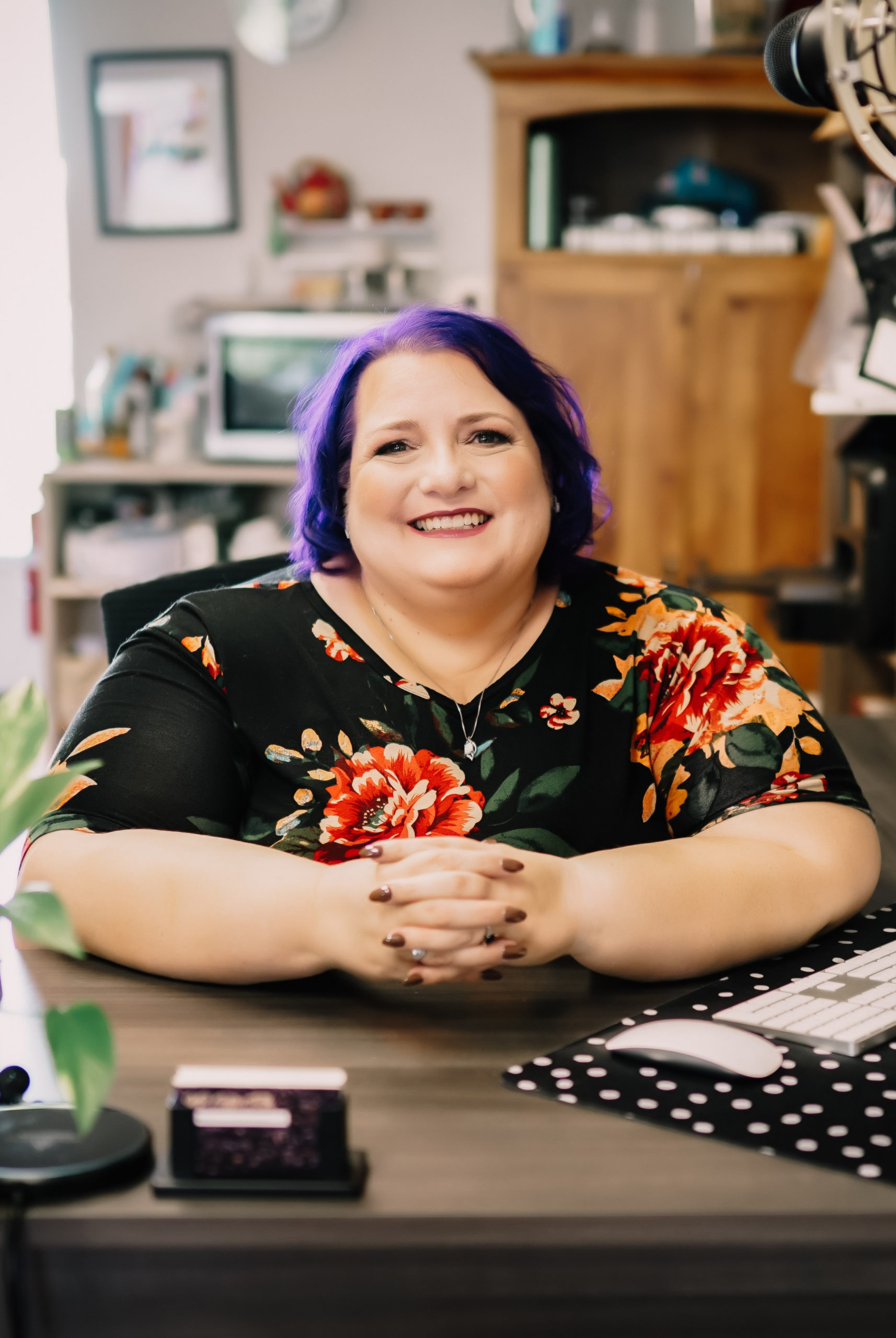
Michelle Frechette
Panelist and sponsorship organizer, moderator, and producer
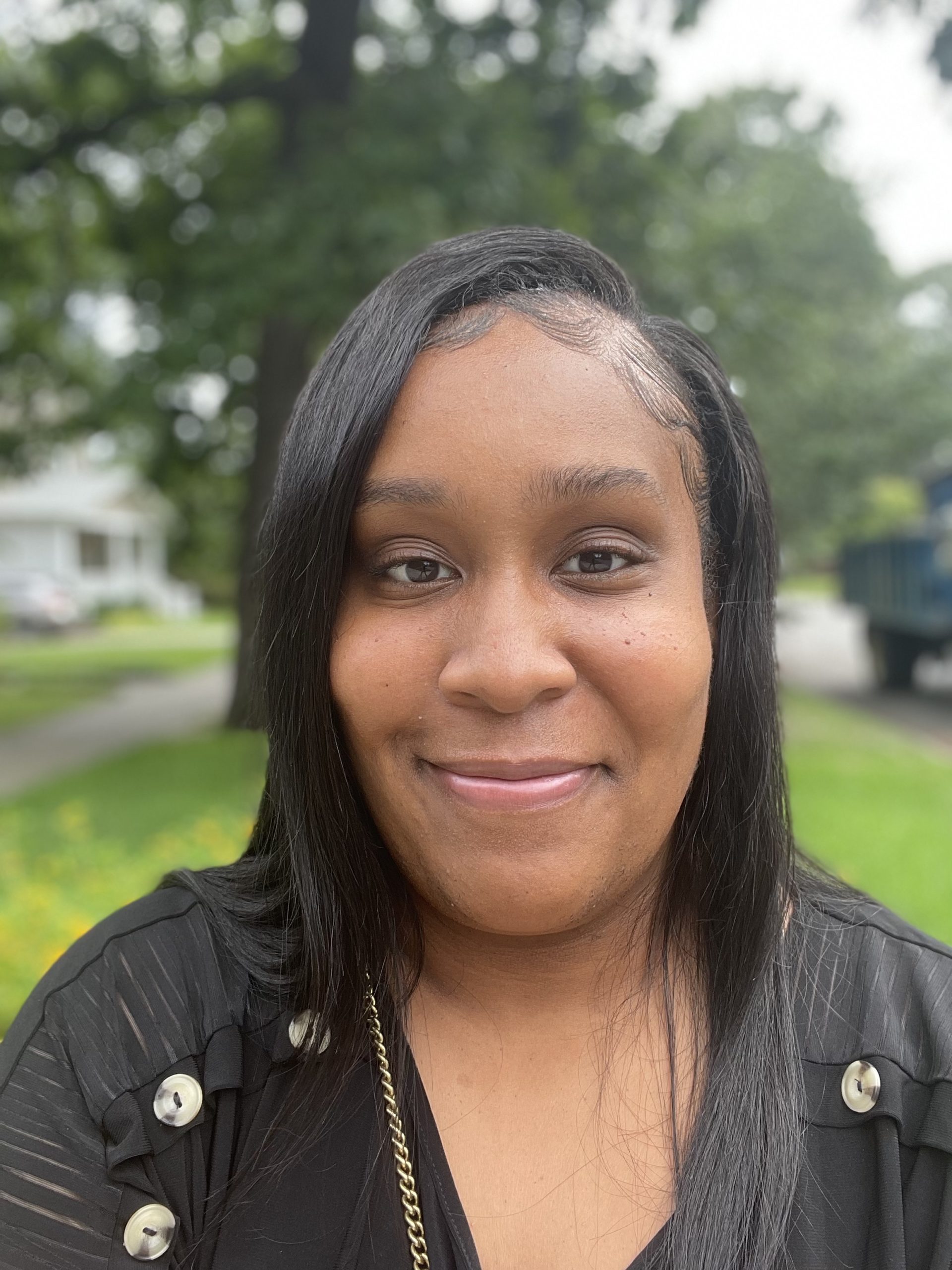
Nyasha Green
Moderator and social media manager.
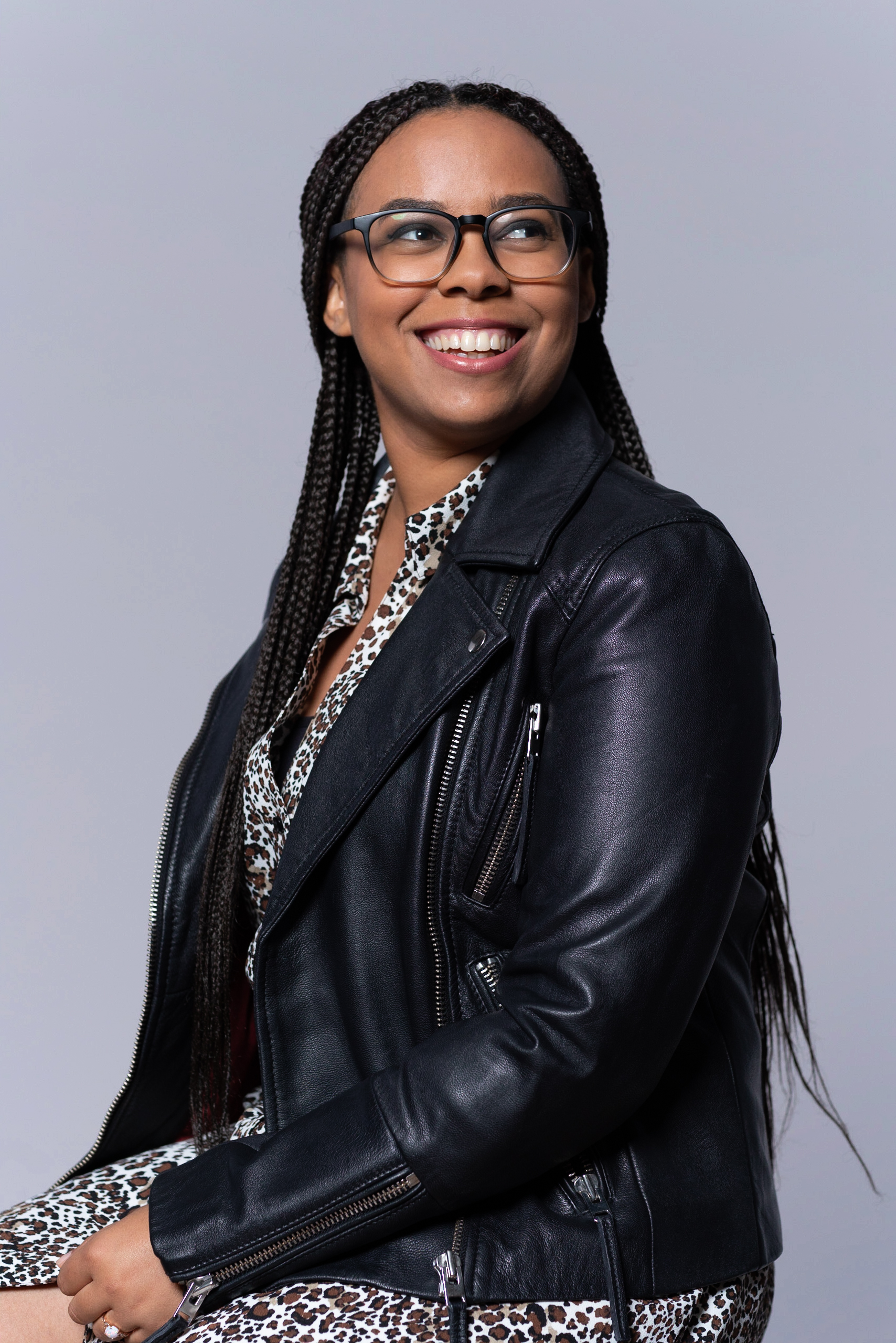
Allie Nimmons
Moderator, designer, editor and producer
Learn More About Underrepresented in Tech
Database
Use our database to connect with underrepresented folks to work with, or add yourself to find work and opportunities.
Podcast
Our weekly podcast discusses topics relating to underreprented people working in tech, as well as tips and advice for allies.
Newsletter
Our monthly newsletter contains news, updates, links, and more targeted toward the success of underrepresented people working in tech.
Our Services
Become a better ally. Pick our brains, or get help making your social media presence or your recruiting process more optimized for DEIB.




